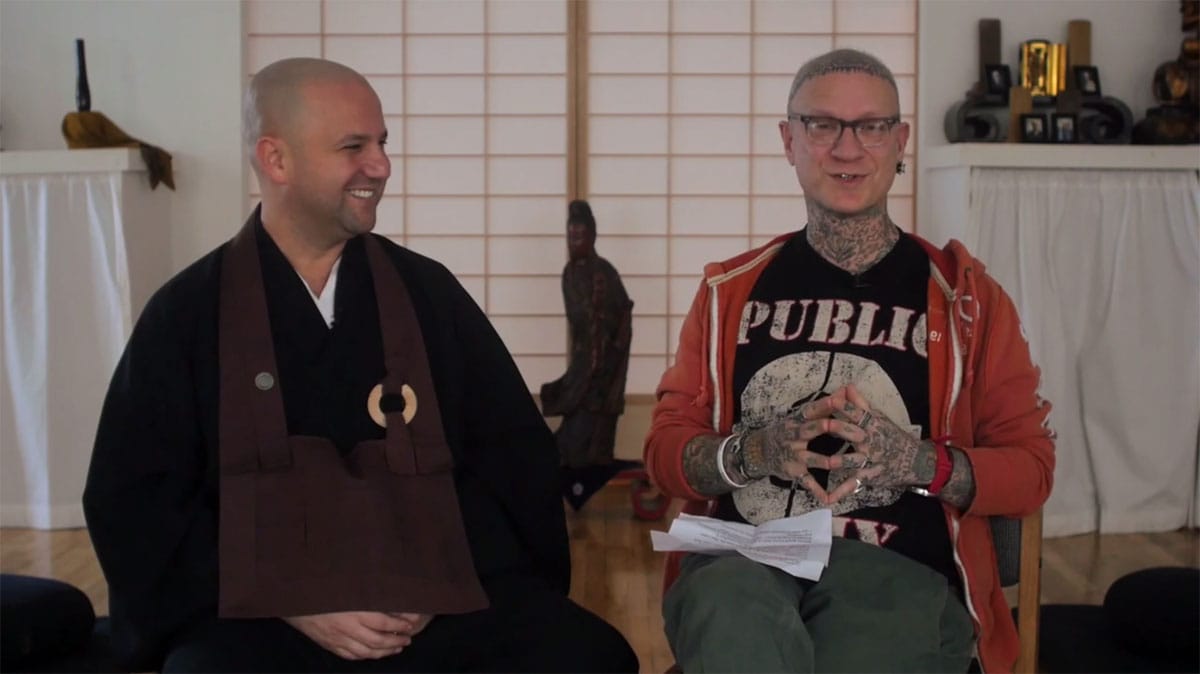Josh Korda and Koshin Paley Ellison explore the problem of spiritual bypassing—using spiritual practice to escape feeling difficult or painful emotions. From the summer 2015 issue of Buddhadharma.
Highlights from the conversation:
Josh: What’s your experience with spiritual bypass?
Koshin: When I began doing clinical work, I found myself walking down hallways thinking that I was this spiritual, helpful person, very compassionate. People really wanted me to be with their anger and their jealousy and their rage, and I realized that in some ways, I’d used my practice to avoid those parts of myself. I wasn’t really living fully. How about you?
Josh: I started practice when my dad became a Buddhist, and I’d been practicing for years—well decades—when 9-11 happened, and shortly thereafter, I started to have a clinical depressive episode. I’m quite good at developing concentrated states, and I can use mindfulness to open to experiences, but there was still this underlying agenda, this hope that if I meditate, I won’t have to feel any of this. I thought, these feelings are not supposed to be here. That not only undermined the ability of these feelings to arise and pass, but it actually added the secondary story of, I’m not doing my practice well enough because I’m feeling sadness, I’m feeling grief, I’m feeling confusion. I had to completely start over in terms of realizing that practice is about welcoming, holding, opening to and nurturing these feelings.
A lot of people who come to New York Dharmapunx have had difficult relational experiences—painful childhoods or breakups—and there’s this hope that somehow Buddhism will be the way that they can live without having to become vulnerable or have risky, deep, empathetic connections in their lives. But as the Buddha said over and over again, if we are to find any peace, we need to have wise, deep, spiritual connections with other people in our lives. The cushion creates a safe container, but eventually we need to find another person and disclose not just the pretty feelings but the dark feelings of loneliness, despair, sadness, fear. I need to talk to you and bring that to you. You need to talk to me and bring that to me.
Koshin: The reason we founded the New York Zen Center for Contemplative Care was this huge gap that we saw in practice, in our own practice—the need, yes, to meditate, to study with a teacher, to be in a community, but we also needed to learn how to be in a relationship. What do we do in that moment when we feel another person withdrawing or angry or really having a wonderful time, you know? And what do we do if we’re uncomfortable with that feeling that we’re being empathically attuned to—ambition, jealousy, envy? Also joy. A lot of people have difficulty actually feeling joy.
Josh: And grief. For me, it’s an important to examine how in the early Buddhist suttas, the Buddha sort of teaches that people who were grieving and demonstrating deep sorrow were making some kind of self-indulgent mistake or being unskillful. In fact, in the Sala Sutta, the Buddha says it’s not by weeping and grief that you gain peace; to fall under the sway of grief, he says, is not skillful. To me, as Buddhism integrates itself into the West and into our practice, I think we need to have a whole new relationship with grief. It allows the emotional brain to process loss. If we try to use Buddhist practice as a way around grieving, not only are we not coming to grips with the loss of others, but when the times comes for our own death, we won’t be able to process it in any meaningful emotional way.
Koshin: I think we’re so frightened, especially around sickness and death. Bodies are whisked away, sick people are put in hospitals, dying people are put in hospice. Everything is relegated away, so we don’t have experience. It’s heartbreaking to see the struggle that people have, you know, gripping the foot of the dying person’s bed, terrified to even get close to someone physically. It’s like, if I get close to it, I’ll catch it.
Josh: I think what people need to realize is that that which we repress or avoid doesn’t just go away. People who have an anxiety around groups or speaking in public, if they don’t work on that, then the moment they actually do have to speak in front of other people—which will happen—they have a nervous breakdown, a panic attack. And, if we avoid the recognition, the reflection, the opening to death, then what happens when it does eventually appear? Then our relationship with it will be dysfunctional. We think, I can’t be here; this is not supposed to happen; this should not be happening to me. The entire spiritual practice is founded upon opening to that. The Buddha—his entire journey started with seeing old age, sickness, and death. In our own lives, if we don’t allow ourselves to open to the grief of others, to the loss of others, to—
Koshin: To the growth of others.
Josh: —to the growth of others, then we have no possibility of spiritual growth ourselves.

